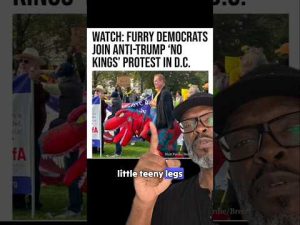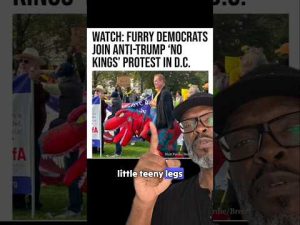In the heart of sunny California, where the palm trees can only shade so much political heat, there seems to be an ongoing saga that’s worthy of a screenplay. Last week, Katie Porter, a prominent figure vying for the governor’s seat, faced quite the political tumble. It wasn’t just a bad hair day but more of a monumental political slip. She found herself abruptly exiting an interview simply because a journalist dared to, gasp, ask her questions. Questions, it seems, that were entirely too normal and decent for her taste. And this walkout wasn’t just dainty sidestepping; it was the kind of hasty retreat that leaves one wondering if they were witnessing an episode of a reality TV show.
The dust hadn’t settled before Porter decided that maybe, just maybe, her abrupt departure needed some damage control. Enter the apology tour. With a somber acknowledgment, she bravely admitted to her lapse while simultaneously insisting she is, nevertheless, committed to helping her fellow Californians. It’s a classic case of trying to have it both ways, suggesting she’s both apologetic yet steadfastly unwavering in her mission. Let’s face it, “I understand I messed up, but I’m also the hero in this story,” is a narrative as old as politics itself and about as convincing as a teenage excuse for missing curfew.
Meanwhile, stirring in the background of California’s political theater, there’s the hum of a broader conversation on democracy. Former Governor Arnold Schwarzenegger is making waves with a rather novel proposition. He suggests a “Save Democracy Act” that champions ideas such as a national holiday for Election Day, fair redistricting, and the ever-contentious voter ID requirement. The plan is meant to unite, under the assumption that common sense still has a place in the political realm. After all, having people actually take a day to vote instead of being hustled along like cattle might just lend a refreshing civic moment to an often-frenzied process.
But while some might argue that these proposals bring a cheerful nod to both sides of the aisle, the reaction in some progressive havens has been more akin to crickets in an empty field. Who would have thought that the mere mention of voter ID could cause such ripples? In many countries, voting without an ID is as unheard of as a sunny day in Seattle, yet here the debate has the fervor of a thousand caffeinated talk show hosts. No wonder there’s a bit of head-scratching going on.
As if these plotlines weren’t enough, there’s the recurring drama around voting procedures themselves. Some on the right criticize early voting, claiming it’s a boon for those who wish to vote with the least amount of information possible. Their argument rolls out against mass mail-in ballots floating around ubiquitously, like coupons that have lost their way. It’s framed as an unseen menace undermining election integrity. It seems some folks would prefer the thrill of casting a vote as close to the wire as possible, presumably for that extra dose of campaign adrenaline.
Taken altogether, California is providing quite the political theater these days, with just enough intrigue to keep everyone guessing about the next act. Whether it’s Katie Porter’s momentary lapse in decorum or the grand vision of democracy-reforming policies, the Golden State remains true to its reputation: the land of endless brainstorms and dreams, even if some of those ideas seem to be brewed up more theatrically than practically.







